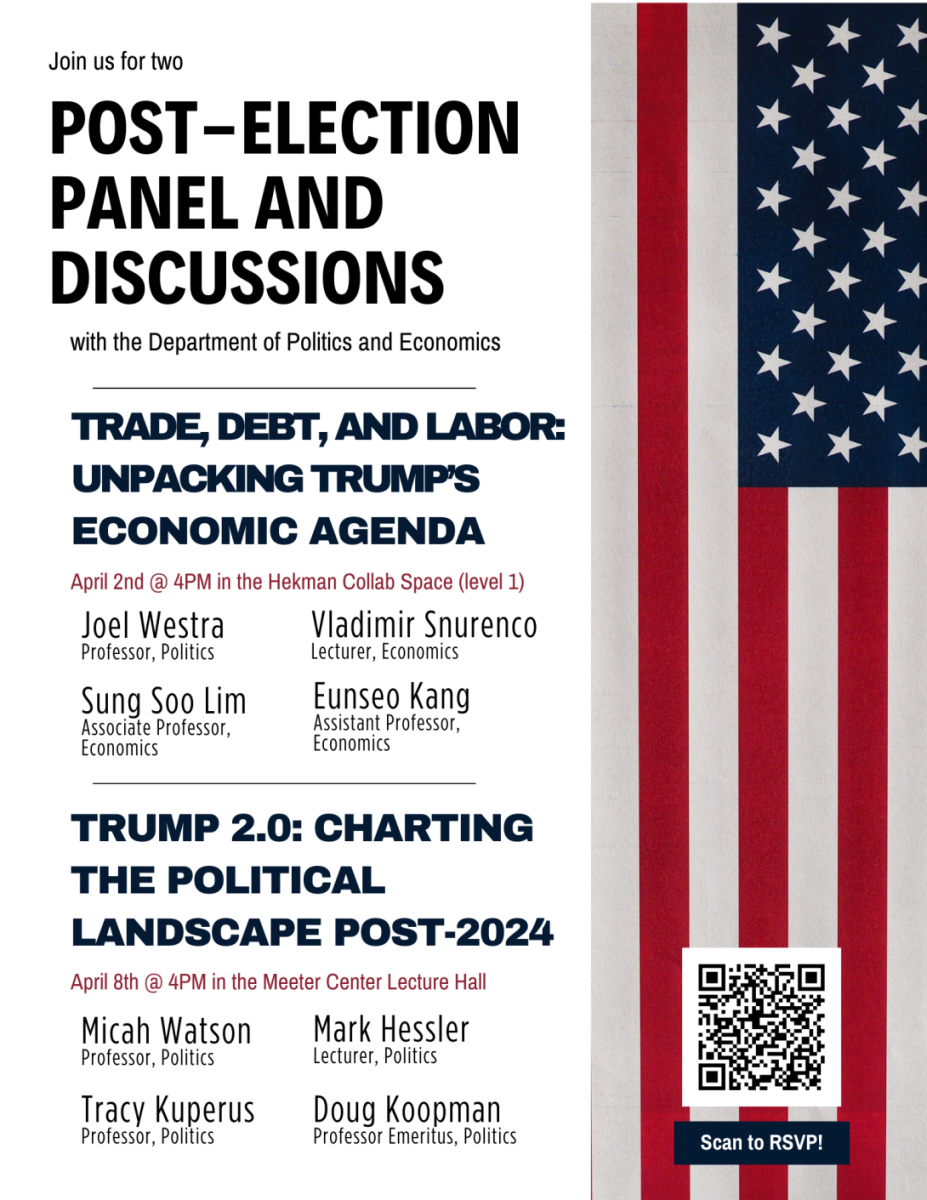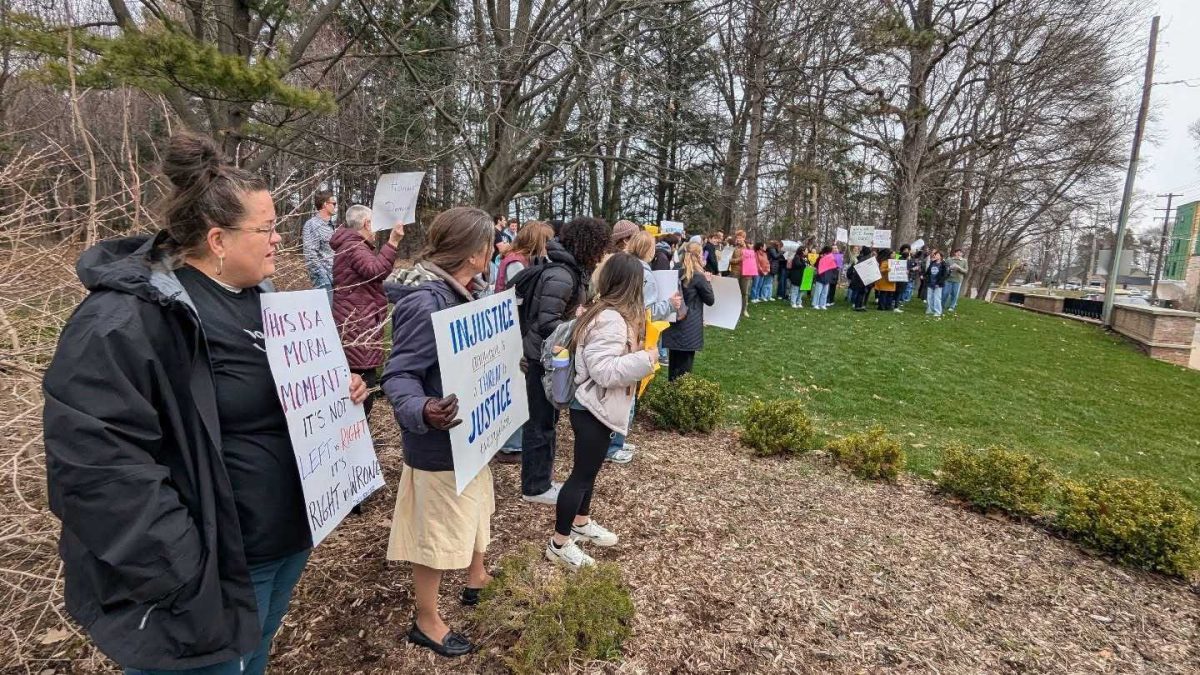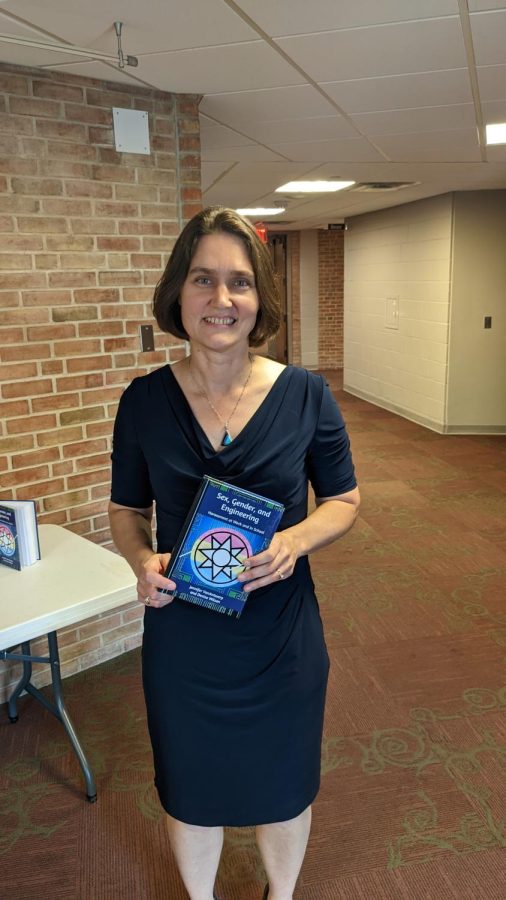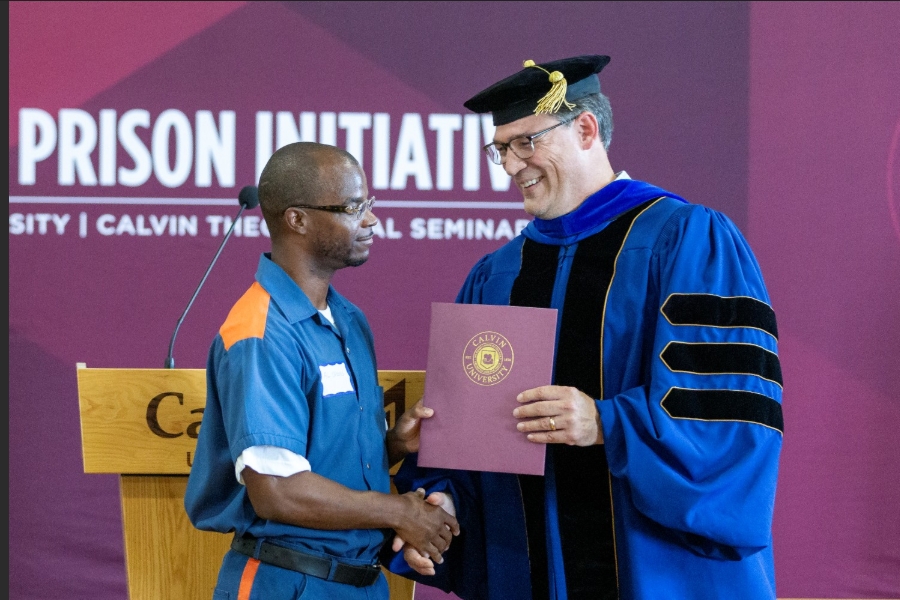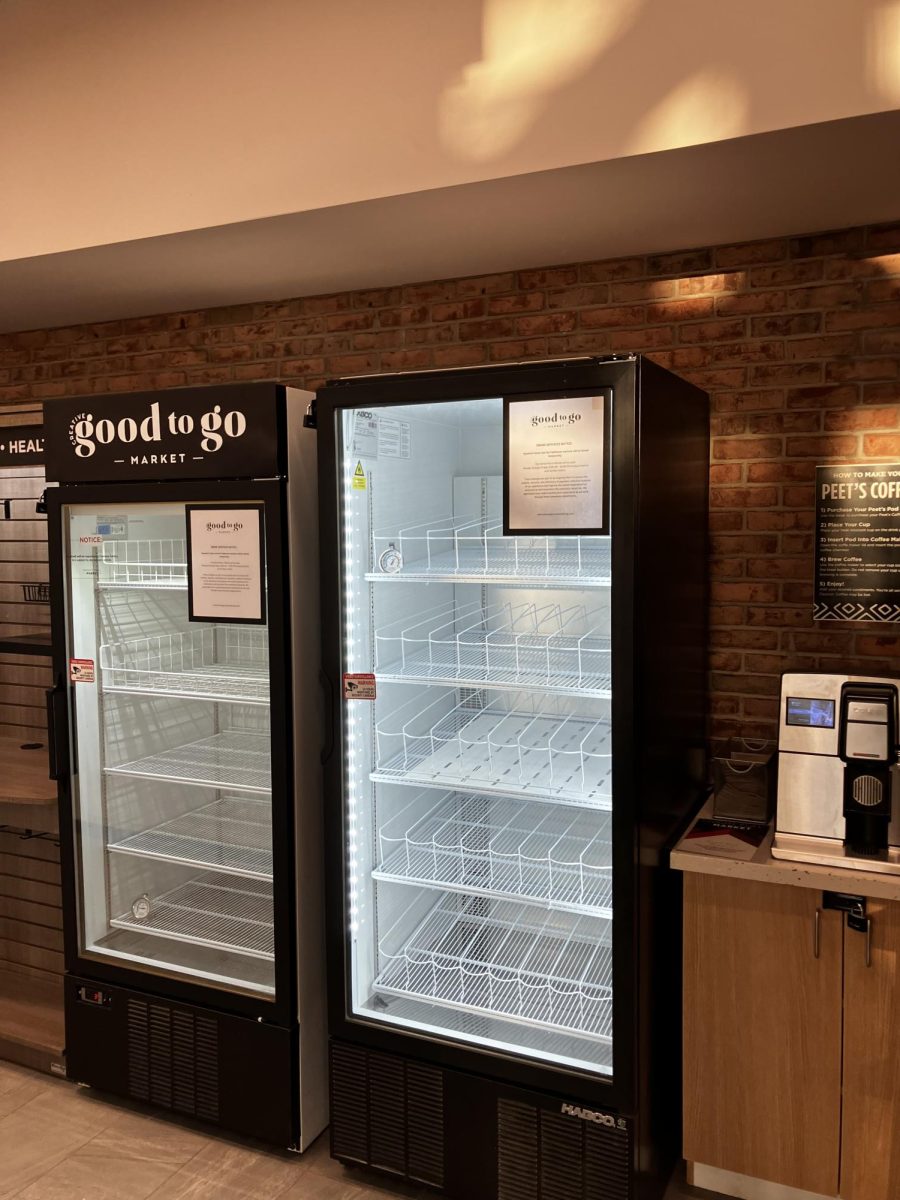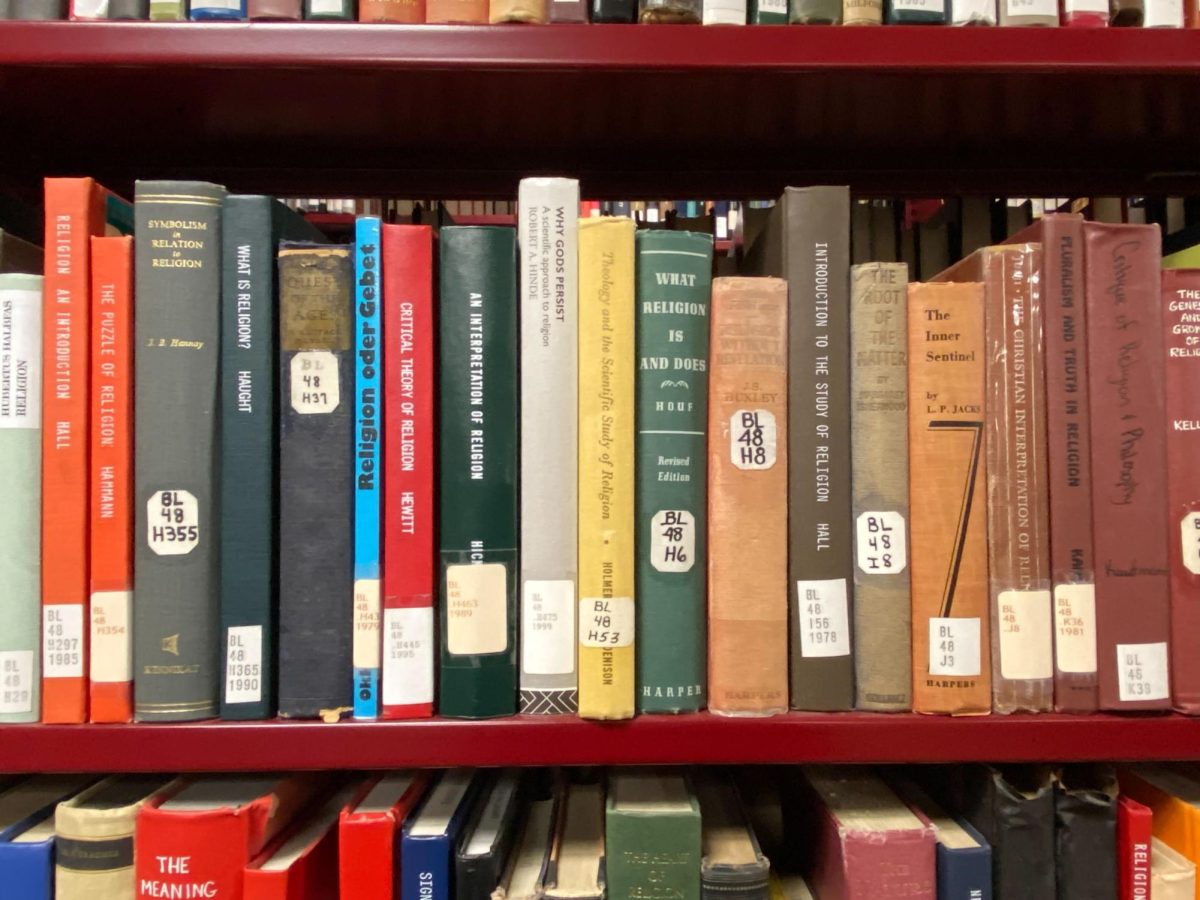On Tuesday, April 8, Calvin’s Department of Politics and Economics hosted a panel discussion on current U.S. federal government affairs. Issues discussed ranged from program cuts to democratic backsliding to tensions between President Donald Trump and the court system.
The talk, entitled “Trump 2.0: Charting the Political Landscape Post-2024”, included presentations from political science professors Tracy Kuperus, Micah Watson, Doug Koopman, and Mark Hessler. About 70 people — a mix of Calvin students, faculty and community members — attended.
For those not able to join, Chimes is sharing some highlights from the talks.
Tracy Kuperus
Tracy Kuperus, whose area of expertise is comparative politics, focused on the question of how populism — a political approach that pits “the people” against the elites — can lead to democratic erosion. “Trump is a populist; he’s called a rightwing populist,” said Kuperus, noting that leftwing populism also exists.
According to Kuperus, governments exist on a continuum of “political regimes,” with full liberal democracies (which have fair, independent, representative elections) at one end of the spectrum and complete autocracies on the other.
Where a country falls on this spectrum can change. Autocratic countries can move toward democracy — a process known as “democratization” — and democratic countries can lose some (or all) of their democratic traits. When a country loses some of its democratic traits, this is known as “democratic backsliding.” If it moves into the territory of autocracy, then it’s referred to as “democratic breakdown.”
In populist-influenced democratic erosion, leaders use polarization and extremism to convince people to vote for them. Once they gain control of the executive branch of government, they “loosen horizontal constraints [and] limit civil liberties,” said Kuperus. Examples of this could include disrupting or ignoring the balance of power and the detention of legal residents.
Kuperus cited Italy, Austria, Poland and Hungary as countries which have experienced democratic erosion as a result of populist leaders. According to Kuperus, Poland and Hungary underwent democratic breakdowns; Poland has since democratized.
Now, amid recent political events, some are concerned that the U.S. might be heading towards more democratic backsliding or even breakdown. According to Kuperus, political experts have had a range of responses to these fears. Some believe that the “active citizenry” of the U.S. will be able to oppose democratic erosion through voting and advocacy. “The most pessimistic argue that we are headed for a mild competitive autocracy” through the “weaponization of bureaucracy,” said Kuperus.
Kuperus did not state which position she found more convincing, and she suggested that it may not be immediately clear which prediction is correct. “Populism slowly erodes democracy. It doesn’t happen overnight.”
Micah Watson
Micah Watson, the current executive director of the Henry Institute for the Study of Christianity and Politics, presented on the relationship between the Trump administration and the Supreme Court. In the leadup to the 2024 presidential election, there was political buzz about how each candidate, if elected, would approach the Supreme Court.
Opponents of Kamala Harris often pointed to her reported support for increasing the number of Supreme Court justices — an act often referred to as “court-packing” — that could significantly impact the court’s ideological makeup.
Meanwhile, Trump’s opponents expressed concerns about how the newly elected president would use the Supreme Court’s 2024 ruling that granted presidents immunity when exercising their core constitutional powers. Regardless of how one feels about Trump, Watson said that people should be cautious “not just for how Trump might leverage this ruling, but for how every president might leverage this ruling.”
Watson emphasized that in general, people need to be aware of how political acts — specifically court rulings — might be used by future politicians and judge rulings accordingly. “We have to decide whether we’re committed to political principles as such, or just when they help those who agree with us,” said Watson.
One example he cited was the Supreme Court’s rejection of a district court’s restraining order that blocked Trump from using the Alien Enemies Act to deport Venezuelan migrants accused of being gang members. Watson described the decision as a “short-term victory for the White House,” since the ruling still gives those detained a chance to challenge their deportation.
Although the ruling was unpopular with many Trump opponents, Watson wanted the audience to consider the precedent that could be established if the Supreme Court had ruled in favor of the district courts. “What do we think about a district court making policy with a court order?” asked Watson.
Like Kuperus, Watson did not attempt to predict the future. However, he pointed to the midterm elections and “how the people respond to court rulings … especially if Trump gets a ruling he doesn’t like and defies it” as important indicators in the direction of U.S. politics.
Doug Koopman
Doug Koopman, who has worked in national politics in addition to teaching, discussed how the Trump administration, political parties and Congress affect each other. Koopman described political parties as “sandcastles” that “need endless maintenance” to continue attracting voters as people die, change their mind or enter different stages of life with different needs. Overall, parties “want to make elections signal a change of direction,” said Koopman.
According to Koopman, in the most recent election, Republicans did a better job at activating and attracting voters — especially voters in working-class, white communities who formerly leaned Democratic. “They had strategies to bring those folks in,” said Koopman, pointing to visits made by Trump and now-Vice President J.D. Vance to several Michigan communities.
If the Democratic Party wants to regain ground, Koopman believes it needs to find a strategy of its own for voters from this demographic. In the coming years, “we might have an election about who is serving the working class the most,” said Koopman.
Koopman discussed Congress as a potential source of opposition to the Trump administration, pointing to tariffs and to certain executive orders as areas where Congress has the authority to oppose presidential decisions. “All of these are opportunities for Congress to reassert itself,” said Koopman.
Mark Hessler
Mark Hessler, who directs Calvin’s Master of Public Administration program, talked about how funding cuts could affect the services provided by local governments. The impact of these cuts, which, according to Hessler, includes the “takeback of funds already spent,” is wide-ranging. The Trump administration has cut funding to the Institute for Museum and Library Services, which is “really impacting those services local governments provide,” said Hessler.
School food programs may be affected by cuts to the U.S. Department of Agriculture. The Fair Housing Center of West Michigan faces an “uncertain future,” due to cuts made to the Federal Department of Housing and Urban Development (HUD), said Hessler.
Hessler suggested that more attention on government spending could be a good thing. “DOGE [Department of Government Efficiency] is not just about efficiency but also about accountability.”
However, he also pointed out that local governments often already have efficiency measures in place, and that with less federal funding, local governments may have to increase taxes or offer fewer services.
In spite of this, Hessler expressed some optimism. He cited 2024 research from the Pew Research Center which showed Americans tend to view their local governments favorably. “There’s a lot of support for local governments, in spite of the cutbacks,” said Hessler.




